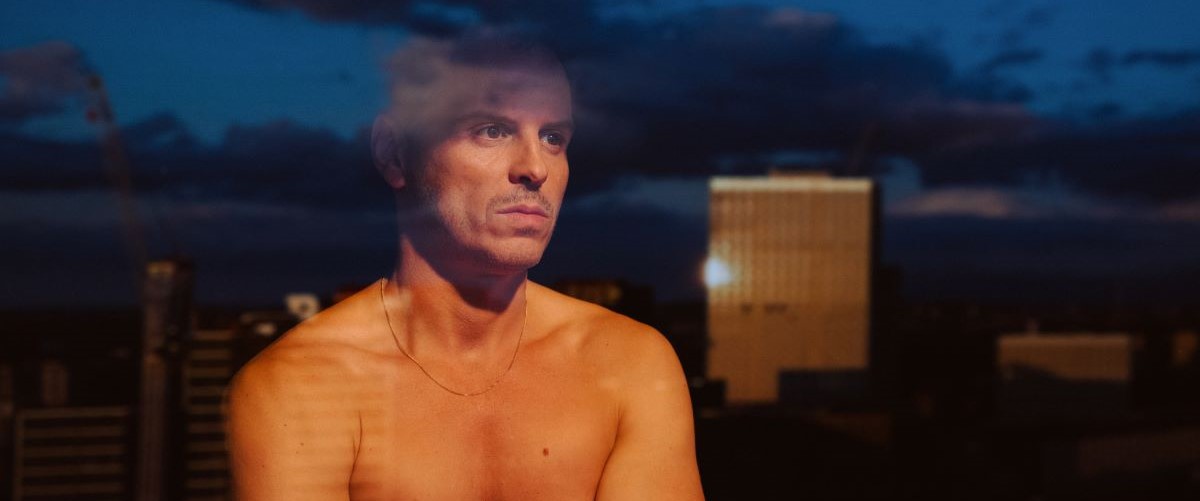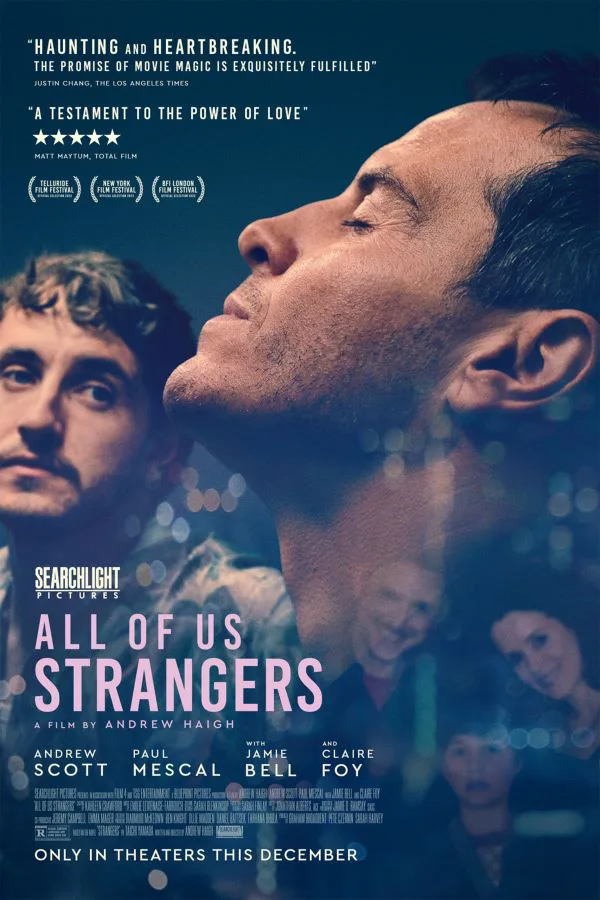The surreal almost supernatural atmosphere of Andrew Haigh’s “All of Us Strangers” is present from the first shots, where the sunset light streaming through the windows of the new apartment building seems piercingly gold, almost molten. There’s something weird about the light, like it’s sentient, reaching out for this building in particular. Then there’s the building itself. It’s mostly empty. There are only two residents. It’s like the building is floating in a spacewhere time either collapses or stretches out like an accordion. Things become possible, things like forming a fragile and unexpected love connection, or, stranger, like being able to speak and meet with the dead. “All of Us Strangers” does these things, creating a sense of uncanniness from the first time we see the golden light hit the building windows, like it’s come across the vast abyss of space specifically for this time, this place.
Andrew Haigh’s other work shows the director’s interest in relationships and intimacy (although not in an otherworldly way). “Weekend” was about a one-night stand’s transformation into something more substantial, occurring, as the title suggests, in a compressed timeframe. “45 Years“, on the other hand, showed the devastating crack-up of a relationship. Both films showed Haigh’s sensitivity to human behavior, as well as the good care he takes of his actors, the room he gives them to feel and create. Charlotte Rampling was nominated for an Academy Award for “45 Years” and no wonder. Haigh loves actors. “All of Us Strangers” is a quartet, featuring four memorable performances by Andrew Scott, Paul Mescal, Claire Foy, and Jamie Bell.
Scott plays Adam, first seen basking in that eerie molten glow, as though being pulled towards it. He’s a screenwriter, supposed to be working on a new script, but instead puttering about and procrastinating. One night the only other resident of the building knocks on his door. This is drunk, flirtatious, charming Harry (Mescal), looking for a hookup. Nothing happens that night but a delicate thread is established.
On occasion, Adam gets on a bus and travels to the house where he grew up in a nearby suburb. Inside live his parents (Foy, Bell), who died in a car crash when Adam was 12. They are the age when they died. Adam shows up at the door, and his parents are eager to hear about what he’s been doing with himself all this time. It’s a reunion, but the intensity of feeling is too much. This sense of “too much” floods the film: every interaction spills over into the next, and the next, with scenes between Adam and Harry, Adam and his mum, Adam and his dad, alternating. There’s no filler, no downtime. It’s one heavy catharsis after the next.
Haigh’s touch is light, though. He has removed the extraneous and distracting. Loosely based on the 1987 novel Strangers, by Japanese novelist Taichi Yamada (who died just last month at the age of 89), “All of Us Strangers” is about a man coming out of hiding, facing his past and his present, simultaneously. Losing both your parents in a car crash at the age of 12 is, of course, a life-altering event. He has gone through his whole life without witnesses. The reunion is not without its hiccups. When he tells his mother he’s gay, she is shocked. It’s like she’s never even heard of such a thing. She worries it will be a “sad” life for him, a lonely one. Her views are outdated. (The flipside, though, is her fears are not unfounded. Adam is sad, Adam is lonely.) When he breaks the news to his dad, the interaction goes a bit differently. (Jamie Bell, always an interesting actor, is just heartbreaking here.)
This potentially maudlin stuff is elevated by the work of all of the actors. What matters here is not just what is being said, but the emotions underneath. All four performers pour pure, undiluted feeling into their performances. The emotion gives the supernatural “All of Us Strangers” a feeling of reality. This is how it might go if you met your dead parents again. You’d want them to know you. You have so many things you didn’t get to say. You’d want to try to say them. There’d be no pussy-footing around, no small talk. You’d have the courage to get to the point.
In real time, the relationship between Harry and Adam unfolds with tenderness and care. Adam, nearly celibate, is uncomfortable with sexual touch and yet yearning for it. The generation gap is present. Harry has no concept of associating sex with a possible death sentence. They talk things out. These scenes, too, are amazing (and make you really feel the lack of frank adult romances in cinema). If there’s no small talk between Adam and his parents, the same is true with Adam and Harry.
Some of “All of Us Strangers” might not work, particularly the ending, which felt convoluted and pre-determined. The premise may seem hokey to some, an artificially generated family therapy session. I can see how this could be the reaction. But I’ll come clean. When I have a strong response to a film, as a critic I interrogate it, whether the response is positive or negative. I look for my blind spots, I question resistance, I ask myself what the film is trying to do and whether or not it does it successfully (as opposed to wishing for a whole other film to have been made). “All of Us Strangers” generated such a strong personal response it obliterated my ability to interrogate it. I had no distance. I’d love to talk to my father again, and let him know I’m doing okay, tell him he doesn’t have to worry. I’d love to see his face again and hear his laugh. Through “All of Us Strangers” I lived out that fantasy vicariously. The emotion was overwhelming.
“All of Us Strangers” flattened me. Interrogation canceled.




















